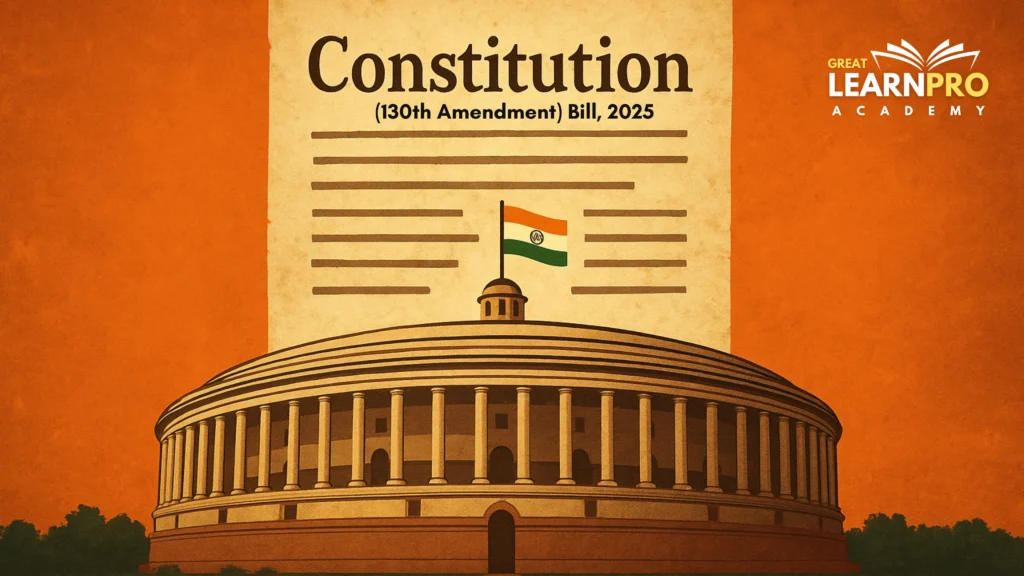
On 20 August 2025, the Union Home Minister Amit Shah introduced the Constitution (One Hundred and Thirtieth Amendment) Bill, 2025 in the Lok Sabha. Touted as a historic move towards accountability in governance, the Bill seeks to prevent individuals facing serious criminal charges from continuing in high constitutional office.While the government projects it as a step toward clean politics and good governance, critics warn that it risks undermining democratic safeguards and federal balance.
Key Provisions of the 130th Amendment Bill
- Automatic Removal from Office: Any Prime Minister, Chief Minister, Union or State Minister arrested and detained for 30 consecutive days on charges carrying a punishment of five years or more would cease to hold office automatically.
- Reappointment Clause: If the person is later acquitted or released on bail, they may be reappointed to their post.
- Amendments to the Constitution: The bill seeks to insert provisions into Article 75 (Union Ministers), Article 164 (State Ministers), and Article 239AA (Delhi’s Ministers).
- Implementation Mechanism: Removal would be effected by the President at the Centre or the Governor/Lieutenant Governor in states and Union Territories.
Rationale Behind the Bill
The government has justified the bill as necessary for upholding constitutional morality and ensuring that individuals facing serious allegations do not continue to govern from behind bars. Home Minister Amit Shah argued that such leaders erode public trust and that India’s democracy demands higher standards of accountability.
Shah also defended the proposal against criticism, remarking that if certain leaders such as Delhi CM Arvind Kejriwal had voluntarily stepped down after arrest, such laws would not have been needed.
Criticisms and Concerns
Despite its stated objectives, the bill has triggered widespread debate.
- Presumption of Innocence at Risk
- Critics argue that mere arrest should not equate to guilt, as the Constitution presumes individuals to be “innocent until proven guilty.”
- Removing ministers before conviction could allow for political misuse of investigative agencies.
- Threat to Federalism
- Leaders like Asaduddin Owaisi (AIMIM) and Dipankar Bhattacharya (CPI-ML) caution that the bill strengthens the Centre’s hand in destabilizing opposition-ruled states by targeting their leaders through central agencies.
- Political Weaponization
- Opposition parties including the AAP, TMC, and SP have boycotted the Joint Parliamentary Committee (JPC) review of the bill, calling it a political ploy to unseat non-BJP governments.
- Constitutional Integrity
- Legal experts warn that the bill could blur the separation of powers and weaken legislative autonomy, enabling the executive to dislodge elected representatives without a court verdict.
Political Reactions
The introduction of the bill sparked noisy protests in Parliament, eventually leading to its referral to a Joint Parliamentary Committee for detailed scrutiny.
- Support: Some voices within the opposition, such as Congress MP Shashi Tharoor, described the proposal as “reasonable,” noting its focus only on serious offences punishable with five years or more.
- Opposition: AAP leaders dismissed it as an attack on political rivals. TMC and SP also refused participation in the JPC, citing fears of misuse.
- Government’s Stand: Amit Shah reiterated that those detained for grave charges should not be allowed to govern from jail, framing the reform as a test of India’s commitment to good governance.
The Legal Backdrop
Currently, under the Representation of the People Act, 1951, disqualification of legislators occurs only after conviction, not mere arrest. This has allowed ministers to remain in office even while in judicial custody. The proposed amendment seeks to close this gap by introducing pre-conviction removal a bold but controversial shift in India’s constitutional practice.
Conclusion
The 130th Amendment Bill, 2025, represents one of the most consequential constitutional reforms in recent times. It reflects a genuine desire to enforce accountability and integrity in public office but also raises serious concerns about due process, federalism, and political misuse.
By sending the proposal to the JPC, Parliament has acknowledged the need for careful deliberation. Ultimately, the challenge will be to balance clean governance with protection of democratic norms, ensuring that India’s constitutional fabric is strengthened rather than weakened.
Sources:
- https://m.economictimes.com/news/india/centre-set-to-introduce-bill-on-removal-of-convicted-ministers-and-cms/articleshow/123394269.cms?utm_
- https://indianexpress.com/article/opinion/columns/bill-for-removal-of-arrested-ministers-offers-promise-of-clean-governance-reflects-will-of-people-10205335/?utm_
- https://www.ndtv.com/india-news/centre-to-move-bills-for-removal-of-pm-chief-ministers-arrested-on-serious-charges-9118875?utm_
- https://timesofindia.indiatimes.com/city/patna/130th-amendment-bill-threat-to-federal-structure-ml/articleshow/123413498.cms?utm_
More Current Affairs: https://learnproacademy.in/updates/
